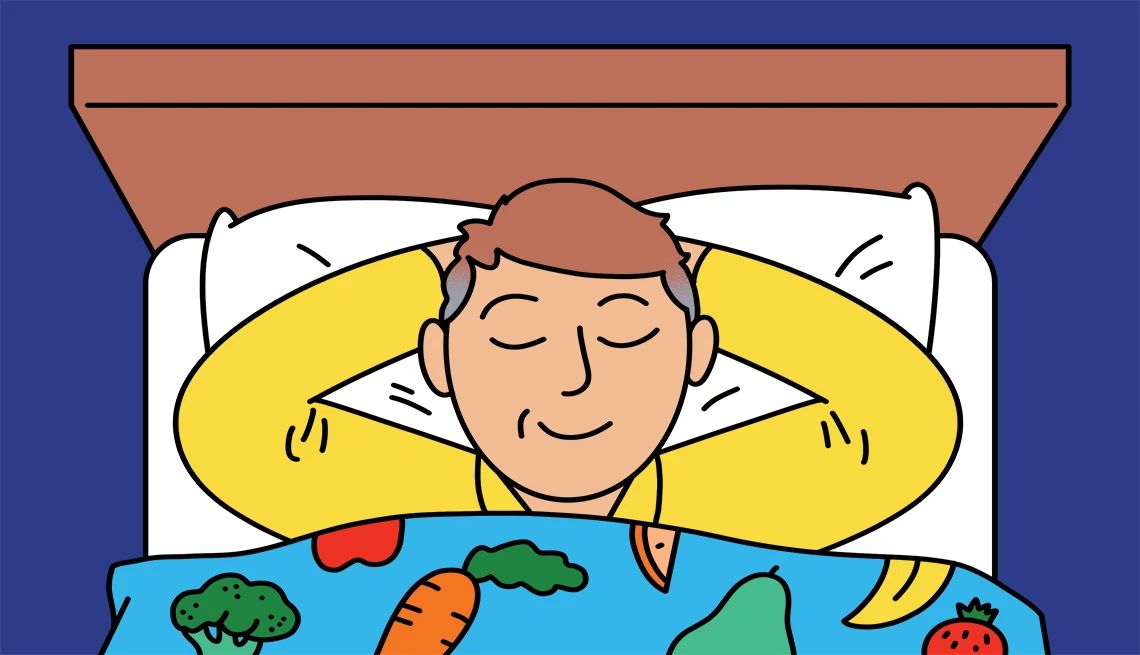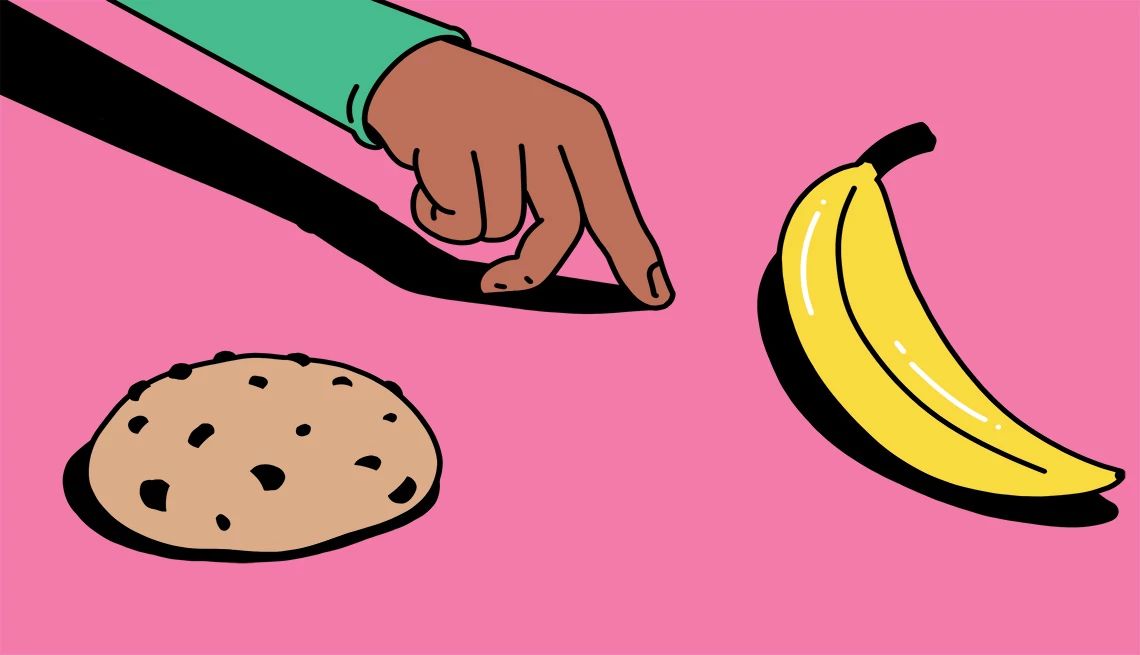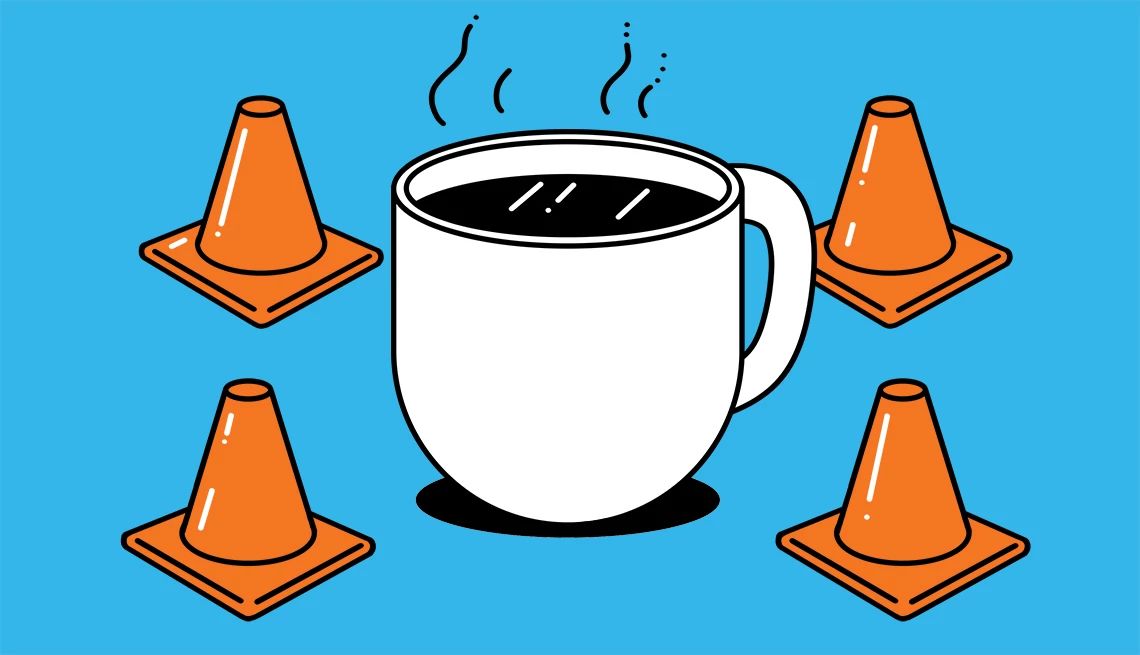AARP Hearing Center


It’s no secret that consuming too much sugar hurts your health. Sugary diets have been linked to everything from weight gain and cavities to serious problems like diabetes, heart disease and stroke. A 2023 study published in BMJ found 45 negative health effects from sugar, including increased risk of high blood pressure, depression and death from cancer. But when a craving for the sweet stuff strikes, it can be tough to resist.
Food cravings are common and can hit you for lots of reasons: stress, hormonal shifts, habit or even boredom, researchers say. More than 90 percent of Americans experience food cravings, studies show.
It’s not surprising that many of us crave sweets, says Anne Alexander, author of The Sugar Smart Diet. Sugar has a physical effect on the brain, triggering the release of feel-good hormones like serotonin and dopamine. Culturally, we also tend to associate sweet foods with safety, comfort and pleasure. In 2017, the government estimated that Americans consumed more than 17 teaspoons of sugar a day — about two to three times the amount the American Heart Association recommends.
These smart strategies can help tame your sweet tooth.
1. Eat a protein-packed breakfast
Foods high in sugar or processed carbohydrates spike your blood sugar and insulin levels in your bloodstream. When your blood sugar drops again in an hour or two, you will find yourself craving your next fix.
You can keep cravings at bay by starting your day off with a breakfast high in protein, Alexander says, such as eggs, Greek yogurt, cottage cheese or a low-sugar smoothie with protein powder.
Protein can give you energy while keeping your blood sugar levels stable.
It’s a strategy backed by research. A study published in Nutrition Journal found that people who ate a breakfast high in protein (40 percent protein) had fewer food cravings than those who skipped breakfast or had a breakfast that was only 15 percent protein. Check out more of the benefits of high-protein breakfast, including a smoothie recipe.
2. Pinpoint your sugar pitfalls
Try to get to the bottom of what typically triggers your desire for something sweet, Alexander advises. Do you reach for a treat when you are anxious? Lonely? Bored?
Some people wolf down a sleeve of cookies when they need a distraction from a hard project at work. Others devour a bowl of ice cream to treat themselves after a hard day.
“After a complicated or busy day, what we really want is a hug.... But we find ourselves in the kitchen, looking for something to make us feel better,” Alexander says. “Give yourself a moment to really think about what is driving your cravings” and consider alternative ways to handle those feelings, she says.
3. Remove temptation
It sounds simple, but keeping foods you can’t resist out of the house is one of the easiest and most powerful ways to reduce cravings, says psychologist Evan Forman, director of the Center for Weight, Eating and Lifestyle Science at Drexel University. If you have a spouse who insists on keeping sweets in the house, put those foods out of sight and out of reach, like in a container at the back of a top cabinet. Then keep healthier snacks like fruit, nuts and cut-up vegetables within reach.
“If you don’t see the Oreos, your brain won’t say, ‘I have to have it,’” Forman says. “The harder and further away you can put those foods, the better off you are.”
4. Eat just a few bites of the food you’re craving
Some people who try to swear off sweets altogether end up losing self-control and binging. If that tends to happen to you, consider giving in to your craving, but limit yourself to a very small portion, suggests Jamie Pope, a registered dietitian nutritionist and assistant professor of nutrition at Vanderbilt University School of Nursing.
The first two to three bites give you “the most aesthetic bang for your buck,” Pope says. “Enjoy several bites and try to relish it.”
This strategy works especially well if you choose something rich and decadent like cheesecake or a chocolate truffle, Pope suggests. Or maybe you nibble on one Hershey’s Kiss or square of chocolate, letting it slowly melt on your tongue.


5. Improve your sleep
When Columbia University researchers analyzed the sleep and eating habits of more than 500 women, they found that those who slept poorly consumed more added sugar than those who got a good night’s sleep.
“Poor sleep can affect the brain’s rewards center and make you really attracted to unhealthy or sugary foods,” says study coauthor Brooke Aggarwal, assistant professor of medical sciences at Columbia University Medical Center.
Sleep deprivation also suppresses signals of fullness, she says.
To increase your odds of conquering cravings, aim for seven to eight hours of sleep a night, Aggarwal says. (Check out these seven secrets for a better night’s sleep.)
6. Pop in a piece of gum
Research has found that chewing gum can suppress food cravings and help people eat less. Gum can also keep your mouth occupied if you’re in an environment with a lot of tempting foods, such as at a social gathering, Pope says. “I have people tell me they chew gum when they are preparing food so they don’t mindlessly taste,” she says.
A few companies have even developed gums specifically formulated to curb sugar cravings. One, created by a startup called Sweet Victory, uses a plant extract that blocks the sugar receptors on your tongue. (It’s not yet widely available.)
7. Sip hot tea
The next time you’re hankering for a treat, Pope recommends preparing a cup of hot tea. Because you sip it slowly, it can provide a calming experience that helps distract you from your cravings.
Flavors such as cinnamon, peppermint or raspberry provide a natural sweetness to satisfy your sweet tooth. You can also find unsweetened teas in dessert flavors like double dark chocolate, lemon chiffon and almond coconut macaroon.
8. Count to 25
When Rush University researchers rigged a vending machine to build in a 25-second delay when someone chose an unhealthy item, people often switched to a healthy option, according to a study published in the journal Appetite. It worked because humans prefer immediate gratification, the researchers said. So the next time a craving comes on strong, stop where you are, take a deep breath and slowly count to 25.









































































You Might Also Like
Doctor, Why Am I So Tired?
How to get your energy backTry These Tips for Living a Healthier Life
Small changes can add up to big mental and physical results
Recommended for You